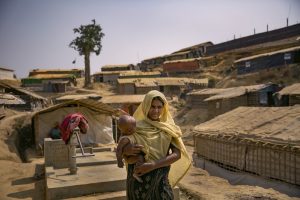In a move designed to burnish its claims to international support and recognition, Myanmar’s opposition National Unity Government (NUG) has promised to grant the country’s beleaguered Rohingya minority population citizenship.
In a policy statement released yesterday, the NUG, which was formed to oppose the military junta that seized power in February, said that the Rohingya are “entitled to citizenship by laws that will accord with fundamental human rights and democratic federal principles.”
It added, “We invite the Rohingyas to join hands with us and with others to participate in this Spring Revolution against the military dictatorship in all possible ways.”
The NUG statement promised to repeal Myanmar’s problematic 1982 Citizenship Law, which is underpinned by a complex taxonomy of 135 “national races,” from which the Rohingya are excluded, complicating their ability to gain citizenship. It said that whatever law replaces it “must base citizenship on birth in Myanmar or birth anywhere as a child of Myanmar citizens.”
In August 2017, the Myanmar army, or Tatmadaw, launched a brutal “clearance operation” against the mostly Muslim Rohingya communities of Rakhine State in the west of the country. Justified as a response to scattered attacks by Rohingya militants, the offensive saw soldiers and vigilantes torch villages, shoot civilians, and drive an estimated 750,000 desperate people over the border into Bangladesh, where most remain in large refugee camps. United Nations investigators later said that the offensives showed “genocidal intent.”
In its statement, the NUG committed itself to the “voluntary, safe, and dignified repatriation” of Rohingya refugees currently in Bangladesh and “of Rohingyas who fled to neighboring countries from Rakhine State due to Tatmadaw violence.” It also said that it would pursue justice for atrocities committed against the Rohingya against other communities, including granting the International Criminal Court jurisdiction over crimes committed within Myanmar.
“We will actively seek justice and accountability for all crimes committed by the military against the Rohingyas and all other people of Myanmar throughout our history,” it stated.
The NUG has attracted some criticism for not explicitly acknowledging that Rohingya are indigenous to Myanmar, instead referring to them as the “Rohingya in Rakhine State.” The historian Thant Myint-U commented on Twitter that the “preference would be to remove entire notion of ‘indigenity’ from official discourse,” and acknowledge the fluidity of ethnic identifications. Nonetheless, it is hard to deny that it represents an important step forward, especially when compared with the view of Myanmar’s military junta, which continues to label Rohingyas as illegal immigrants.
Tom Andrews, the U.N.’s Special Rapporteur on the situation of human rights in Myanmar, yesterday applauded the move, describing it as “an important and notable step forward for the National Unity Government and for Myanmar.”
Aside from the potential benefits for Rohingya refugees, the abolition of the country’s arbitrary list of 135 official national “races,” and the premising of citizenship on membership in these indigenous groups, is a necessary precondition for the healing of long-running ethnic and religious rifts, if not a sufficient one. It also lends some credibility to the NUG’s claims to be working toward an inclusive federal democracy.
Indeed, it is hard to give the NUG the benefit of the doubt on this question, given that it is made up largely of members of the ousted National League for Democracy (NLD) government, which was complicit in the ethnic cleansing of Rohingya communities in 2017.
While NLD officials can plausibly argue that they had no control over the military that carried out the assaults in Rakhine State, the office of State Counselor Aung San Suu Kyi ran interference for the military, dismissing claims of the rape of Rohingya women as “fake,” asserting that the Rohingya were illegal immigrants from Bangladesh, and blaming “terrorists” for “a huge iceberg of misinformation” around the issue. In late 2019, Aung San Suu Kyi even traveled to The Hague to defend her government against claims of genocide.
Since the NUG’s formation in April, this sordid legacy has threatened to overshadow its attempts to gain foreign recognition and support. During a hearing of the U.S. House Foreign Affairs Committee last month, U.S. Congressman Ted Lieu (D-CA) stated that he would block any recognition of the NUG until it appoints a Rohingya representative to its shadow cabinet.
“The new National Unity Government does not include any Rohingya,” he tweeted after the hearing. “We cannot support NUG until that is changed.”
Seen in this light, the NUG’s clarification is clearly geared toward assuaging foreign doubts about its democratic credentials, and gaining support and formal diplomatic recognition.
Whether it results in concrete benefits for the Rohingya remains to be seen. While many anti-coup activists and protesters have apologized online for their silence and passivity over their government’s treatment of the Rohingya, it is hard to know how far such sentiment extends, nor the extent to which it will result in significant shifts in public sentiment toward the Rohingya if and when the military junta is toppled, especially in Rakhine State. Either way, it will be a long time before we know how substantial the NUG’s pledge of citizenship for the Rohingya turns out to be.

































